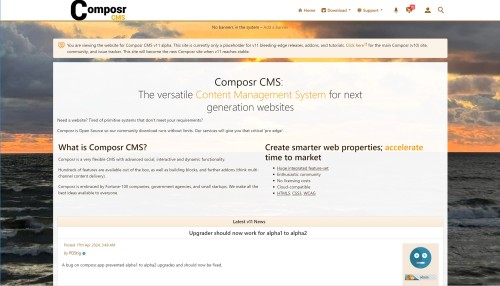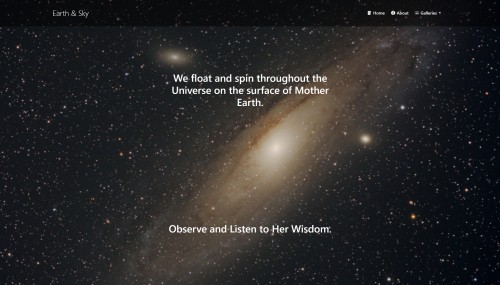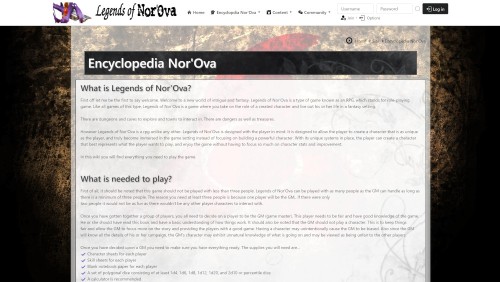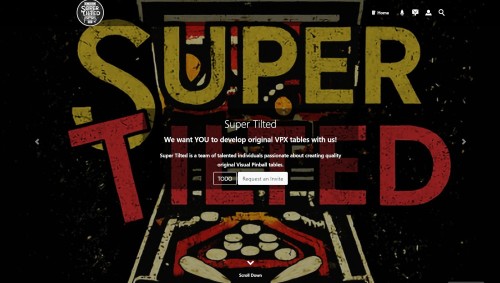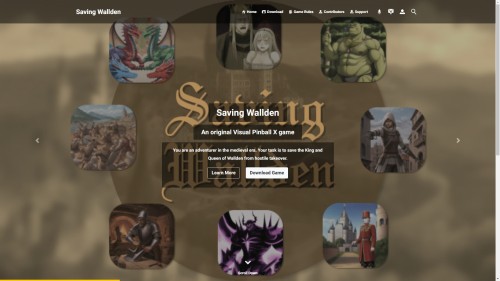Featured Sites: A-Z Index
H
Newest 10 Entries
| Title | Installation |
|---|---|
| Icon |  |
| Description | Quick installer: Our self-extractor allows faster uploads and will automatically set permissions. Wizard-based installation Auto-scans for compatibility problems: Be informed of problems before installing Get your site up and running in just a few minutes Keep your site closed to regular visitors until you're happy to open it Configures server: Automatically generates an htaccess file for you (for Apache). Auto-detection of forum settings for easy integration Install test content |
| Title | Web Pages |
|---|---|
| Icon |  |
| Description | Add virtually unlimited pages to your site WYSIWYG editor (powered by CKEditor) Convenient edit links: Staff see “edit this” links at the bottom of every page. PHP support: Upload your PHP scripts and run them inside Composr (may require adjustments to the script code). Hierarchical page structure: Supports parent and child pages Periodic content reviews: Helping you ensure ongoing accuracy of your content. Add Comcode pages (the default) or static HTML pages Supports revisions and revision control systems (such as git); add new pages as files, and Composr will automatically register them in its system. |
| Title | Downloads |
|---|---|
| Icon |  |
| Description | Clear organisation: Uses a tree structure for unlimited categorisation. Anti-leech protection: download links contain a session ID Community-centred: Allow users to comment upon and rate downloads Many ways to add new files: Upload files. Link-to existing files. Copy existing files using a live URL. Batch import links from existing file stores. Author support: Assign your downloads to authors, so users can find other downloads by the same author. Set licences: Make users agree to a licence before downloading. Images: Show images along with your downloads (e.g. screen-shots) (this implicitly uses galleries). Basic file versioning support Control monthly bandwidth use site-wide |
| Title | Wiki+ |
|---|---|
| Icon |  |
| Description | Think “structured wikis”. Create an encyclopaedic database for your website Use a tree-structure or traditional cross-linking Supports revisions: Track changes Display the tree structure of your entire Wiki+ Allow users to jump in at random pages Make your pages either wiki-style or topic-style Allow members to contribute to Wiki+ pages by adding Wiki+ posts |
| Title | Quizzes and Surveys |
|---|---|
| Icon |  |
| Description | Run a competition: Choose winners randomly from those who passed the quiz. Surveys: Gather data and find trends. Tests: Test members' knowledge on a variety of topics. Cheat prevention: Settings to prevent cheating, such as time limits, question / answer shuffling, and re-testing rules. Integration with points: Charge points to enter a competition, or award points for winning. |
| Title | News and Blogs |
|---|---|
| Icon |  |
| Description | Member blogs: Allow members to have their own blogs on their profile RSS and Atom support: Export and import feeds. Trackback support: Send and receive trackbacks. Scheduled publishing Ping support and RSS Cloud support Multiple news categories and filtering Multiple ways to integrate news into your website Import from RSS feeds Supports geotargeting Members can rate and comment on news articles and blog posts Send out a news article as a newsletter |
| Title | Calendar |
|---|---|
| Icon |  |
| Description | Day/week/month/year views Advanced “recurring event” settings Event subscriptions: Receive reminders and notifications by event or event type Warnings about conflicting events Microformats support Integrate a calendar month view, or an upcoming events view, onto your design Supports categories: Have multiple event types Multiple time zones: Have different events in different time zones with configurable conversion settings. Priority flagging: Choose between 5 priorities Programmers can even use the calendar to schedule custom tasks (Commandr) to be run RSS and Atom support: Export support, but also support for overlaying news feeds onto the calendar. Supports geotargeting Feedback: Allow members to comment and rate events. Segregate feedback on recurring events by date. |
| Title | Galleries |
|---|---|
| Icon |  |
| Description | Multimedia: Supports images, videos, audio, and more. Personal galleries: Allow your members to create their own galleries which show up on their profile. Support for embedding YouTube videos: Save on bandwidth. Auto-detection of video length and resolution (most file formats) Full tree-structure support: Have galleries within galleries within galleries. Multiple display modes View entries as a slideshow Automatic thumbnail generation Mass import: Also supports importing metadata Optional watermarking: To guard against thieving swines
Geotargeting Adjustments: Automatic size and orientation adjustments according to metadata. |
| Title | Catalogues |
|---|---|
| Icon |  |
| Description | Think “databases on my website”. Flexible data control: Set up multiple catalogues, each with its own set of fields. There are many types of fields, such as short text fields, upload fields, and date fields. Multiple display modes: Display the contents of categories using tables, boxes, or lists. Powerful structure: Each catalogue contains categories which contain entries. Catalogues can have a tree structure of categories and/or work from an index. Configurable searching: Choose which fields are shown on categories, and which can be used to perform searches (template searches). Compliance with data protection legislation: Specify which fields may contain sensitive data. These fields will be anonymised as appropriate when members download or purge their data. Entirely customisable: Full support for customising catalogues, categories, and entries, exactly as you want them- field by field. You can even make custom page templates per-catalogue. Classified ads: Entries can automatically expire and get archived. You can also send out view reports. Community interaction: You can allow users to comment upon and rate entries. Import data from CSV files Periodic content reviews: Helping you ensure ongoing accuracy of your data. |
| Name | Patrick Schmalstig |
|---|---|
| Photograph |  |
| Title / Role | Lead Developer |
| Contributions / Notes | Joined Chris Graham behind the scenes in the development of Composr CMS in 2016. Took on the lead developer role in 2023 when Chris Graham stepped back to attend to his new lifestyle changes. Spearheaded the development of Composr CMS v11 and the new website, Composr.app. Formed the company PDStig, LLC to take on professional support and development for Composr CMS users especially after the discontinuation of ocProducts, Ltd. |
| Links |
Top 10 Entries
| Question | Can I display different content to different usergroups? |
|---|---|
| Answer | Yes, you can achieve this by leveraging Tempcode within your templates. By using conditional statements like {$IS_IN_GROUP} and {$HAS_PRIVILEGE}, you can show or hide specific content sections based on the user's group membership or privileges. This technique allows you to "tease" premium content to non-paying users or tailor the user experience based on their access level. |
| Question | What are match-key permissions and why would I use them? |
|---|---|
| Answer | Match-key permissions provide a more granular level of access control beyond the standard zone, page, and category permissions. They allow you to restrict access based on specific "match-keys", which are unique identifiers for different actions or content within Composr. For instance, you could use match-key permissions to prevent guests from submitting banners or to restrict access to the member directory for all but specific usergroups. You can also specify custom access denied errors for each match-key. A "match-key" is typically a page-link, such as cms:cms_banners:add. |
| Question | How can I control who can view specific pages or categories? |
|---|---|
| Answer | You can manage access control for zones, pages, and categories primarily through the Permissions Tree Editor (Admin Zone > Security > Permissions Tree Editor). This tool provides a central location to set view permissions for different usergroups. You can also edit individual zone and category permissions through their respective editing interfaces, but the Permissions Tree Editor offers a more streamlined and efficient approach. |
| Question | What is the difference between access permissions and privileges in Composr? |
|---|---|
| Answer | Access permissions control whether members of a certain usergroup can view specific areas of your site, such as zones, pages, and categories. A member only needs one of their usergroups to have access permission to view the content. But permissions work on a deny-first policy; if one of the permissions applicable to viewing something is denied for a usergroup, then the whole thing is denied for that usergroup (e.g. even if a download itself grants access, access will be denied if its category denies access). Privileges, on the other hand, dictate what actions a usergroup is allowed to perform across the website, like using advanced Comcode or bypassing the word filter. |
| Question | How can I change the news archive display to show summaries instead of just headlines? |
|---|---|
| Answer | By default, the news archive screen shows only headlines. To display summaries like the news block, add :inline=1 to the page-link. For example, if your news archive page-link is site:news, modify it to site:news:inline=1. This will show summaries instead of just the headlines in the archive view. |
| Question | What are Trackbacks and how do they work in Composr? |
|---|---|
| Answer | Trackbacks are a blogging feature that creates a link from an article on one blog to an article on another, acting as a citation mechanism. How Trackbacks Work:
To enable trackbacks, go to Admin Zone > Setup > Configuration > Feature options and check the "Trackbacks" option. You can then enable trackbacks for individual content items. |
| Question | How can I filter the news archive to show specific content? |
|---|---|
| Answer | The news system allows advanced filtering:
These filters are controlled through parameters passed to the news blocks and carried through navigation links. When viewing a news post, you can also filter by the categories associated with that post. |
| Question | How do I display external RSS feeds on my Composr website? |
|---|---|
| Answer | Composr offers two blocks for displaying RSS and Atom feeds in a news-like format:
To add a block, use the Block Construction Assistant or insert the following Comcode into your page: [block="http://example.com/feed.xml"]main_rss[/block] [block="http://example.com/feed.xml"]side_rss[/block] Replace "http://example.com/feed.xml" with the actual feed URL. Important: Exercise caution when using external feeds. Ensure the source is trustworthy, as malicious feeds can contain harmful code. |
| Question | What are RSS/Atom feeds and how do they benefit my website? |
|---|---|
| Answer | Feeds, in formats like RSS and Atom, are XML files that syndicate your website content, making it accessible beyond your website. They can be viewed using feed reader applications (e.g., Feedly, Vienna) or integrated into other websites or web browsers. Composr supports both RSS and Atom for syndicating news and other content. While RSS is more common, Atom is a cleaner, standardized format. Both effectively share your content updates. Benefits:
|
| Question | What are Personal Categories/Blogs in Composr? How do I create one? |
|---|---|
| Answer | Composr allows members of permitted usergroups to have their own personal news categories, also known as "blogs". These blogs appear as a tab on the member's profile (Conversr-only) and may also appear in the main news block depending on your configuration. To create a blog, a member simply adds a news post and selects their personal category. If the category doesn't exist, it will be automatically created upon submission. A dedicated "Blogs" CMS module (Admin Zone > Content > Blogs) is available if the "Separate blogs" configuration option is enabled. This simplified module focuses on blog posting and can be used to restrict members from submitting to general website news. |


